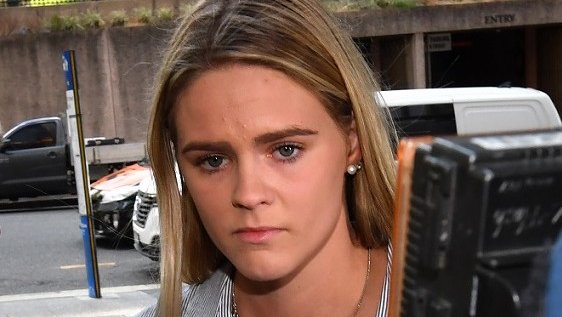The Court of Arbitration for Sport has published its decision in the Shayna Jack case, revealing that the Australian swimmer described herself as “scared” and “paranoid” during the hearing.
Key points:
- Available evidence could not determine whether Jack had intentionally or unintentionally ingested Ligandrol
- There was no evidence of long-term use of an anabolic agent
- Jack said the positive finding “killed” her and that she “wanted to be a positive role model”
Last week the Court announced the decision to reduce a four-year ban to two after Jack tested positive to Ligandrol in 2019.
The most revealing aspect of the hearing was the evidence given by an expert called by Sport Integrity Australia.
Professor Mario Thevis is the Vice President of Research at the Germany Sport University in Cologne.
Professor Thevis is also a director of the European Monitoring Centre of Emerging Doping Agents and is Editor in Chief of the monthly academic journal Drug Testing and Analysis.
Professor Thevis said that the available evidence meant that it could not be determined whether Jack had intentionally or unintentionally ingested Ligandrol.
However, Jack’s profile “does not suggest a longer-term use of an anabolic agent”.
The documents say that Jack was “subjected to a rigorous, thorough but very fair cross-examination” by the barrister for Sport Integrity Australia, Houda Younan.
Under cross-examination, Jack said the positive finding “killed” her and that she did not want to be left “fighting for my career”.
“I don’t want an innocent athlete like myself to go through this,” Jack said.
Jack added that she would “never touch” Ligandrol and that she was now “paranoid” and “scared” every day.
“I want to get to the bottom of how it happened to avoid it happening again.”
Sport Integrity Australia “accepted that there was no direct evidence that [Jack] ‘intentionally’ ingested Ligandrol to enhance performance”, agreed that the level of the banned substance was low, and there “was no evidence of any long-term usage” of the substance.
‘Denials … the common coin of the guilty’




The sole arbitrator for the hearing was experienced Sydney QC Alan Sullivan, who said the World Anti Doping Code “makes it plain that the term ‘intentional’ is meant to identify those athletes who deliberately set out to cheat”.
Sullivan said he was “greatly impressed” by Jack as a witness, but added that he needed to “exercise great caution in accepting an applicant’s protestations of innocence”.
“While that is true, it would be an over-cynical and wrong approach to the evidence of [Jack] to start with the presumption that what they say is not to be believed or can only be believed if corroborated by other objective evidence.”
Sullivan noted there is a lack of scientific research looking at the performance enhancing benefits of Ligandrol, especially with regard to female athletes.
“This was not a case where either party could present reliable, relevant scientific data supporting or disproving intentional use of the prohibited substance for performance enhancing reasons,” he said.
“On the balance of probabilities … [Jack] did not intentionally ingest Ligandrol,” he said, ruling that Jack’s initial suspension be halved.
The ruling prompted Jack’s lawyer, Tim Fuller, to claim the finding vindicated his client, however former WADA president Dick Pound stated that the Australian swimmer was “still guilty” of doping despite the decision regarding intent.




Sullivan also ordered the cost of arbitration be shared and each party pay their own costs incurred during the proceedings, at odds with a request from Sport Integrity Australia that the swimmer pay all costs.
Jack is believed to have spent more than $150,000 during the arbitration process.
Character references supporting Jack were provided by the coaching director of Swimming Queensland, Drew McGregor, the swimmer’s current coach, Dean Boxall, and fellow swimmers Cate and Bronte Campbell.
Sport Integrity Australia and the World Anti-Doping Agency have until the first week in December to appeal the decision, should they choose to.







